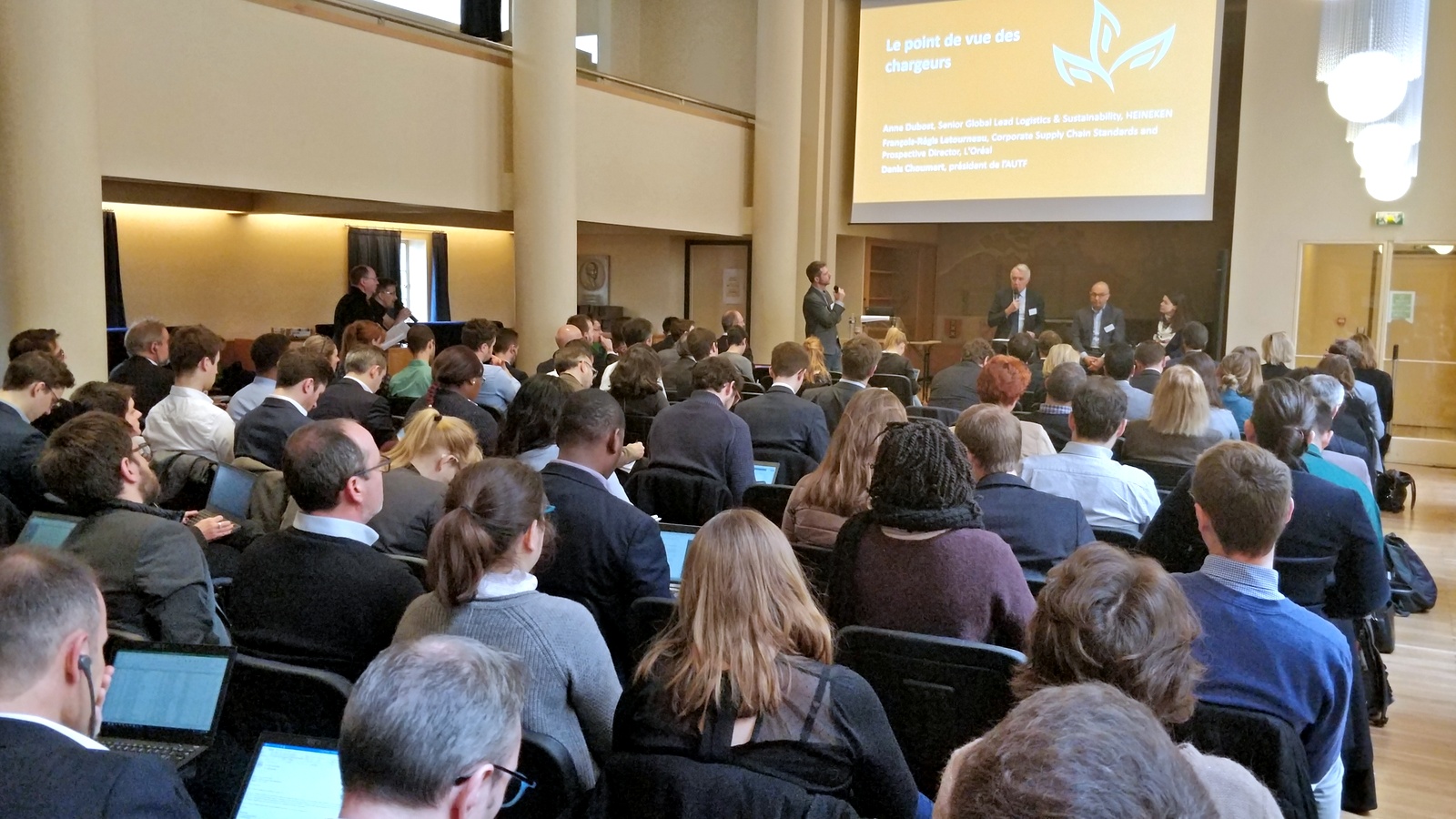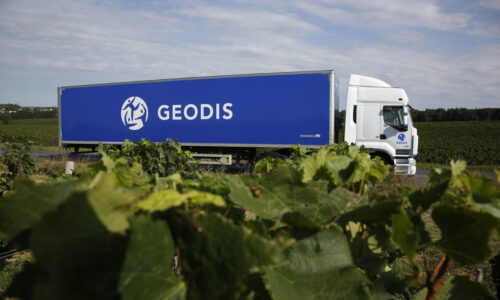Roundtable: Anne Dubost from Heineken, Denis Choumert, president of AUTF and François-Régis Letourneau from L’Oréal
Heineken started measuring its carbon footprint from its logistics activities in 2010, which accounts for 9% of their product’s carbon footprint. Reduction targets are being published annually.
L’Oreal started their environmental and social program in 2013. CO2 emissions in Scope 1 and 2 have decreased by 77% compared to 2011. Within scope 3 the transport sector accounts for 600.000 tons CO2 of over 8 million tons.
To support shippers in improving their environmental performance, the AUTF has launched the FRET 21 program, which is now part of the EVE program.
Presentation of the EcoTransIT World tool by Cécile Bray, GEODIS and Ralph Anthes, IVE
For more than 20 years, EcoTransIT World has been developing and continuously updating a methodology and a tool able to calculate GHG emissions and air pollutants. EcoTransIT is based on 3 pillars:
- The EcoTransIT World Initiative (EWI): a working group that brings together industry players, scientists, and researchers to maintain and develop a methodology and a tool globally recognized for calculating the environmental impacts of freight transport.
- EcoTransIT World Tool (ETW) provides a robust and transparent methodology validated by scientific institutes and a free online awareness tool.
- For professional users EcoTransIT World business solutions are being offered with 3 types of interfaces and allowing users to integrate operational / business data.
Presentation by Eszter Toth-Weedon, Industry Relations Manager, Smart Freight Center and Dr.-Ing. Verena Ehrler, Researcher – DLR / IFFSTAR)
Smart Freight Center is a global non-profit organization working for an efficient and zero-emission freight sector contributing to the Paris Agreement and the SDGs. SFC enabled the publication of the GLEC framework, a universal methodology for calculating GHG emissions which has been tested in the framework of the LEARN project (funded by the European Commission) and promotes the implementation of an ISO standard for calculating GHG emissions.
EcotransIT World Tool is the first certified tool compliant with the GLEC framework.
Summary of the morning
- Expectations of shippers are strong
- Shippers want to be able to obtain comparable data. The work of GLEC and LEARN towards a standardization goes in this direction
- EcoTransIT World is a living system, being continuously updated and improved
- EcoTransIT World allows simulations of GHG emissions and atmospheric pollutants and relies on research using reliable and recognized sources of information.
The French political impulse with Marc Cottignies of ADEME
The French “Info GES” regulation has been in place since October 2013: any transport provider must indicate to its customers the amount of CO2e linked to its transport (see presentation). An order dated February 26, 2019 specifies that the calculation methodology may be certified by an accredited body. It will be up to logistics providers to have the method checked. The functionality of each tool will be screened and this will result in the publication of tools and features that have been audited. Since EcoTransIT World was developed on the basis of the EN16258 standard and in accordance with French regulations, there is a good chance that customer solutions using this tool will be accredited. However, the data integrated in the client business solution must be specified for each case.
Presentation of the EVE Program = Voluntary Commitments for the Environment (4 types): CO2 charter (road carriers), FRET 21 and EVCOM to come for commissionaires. In addition, a platform known as PFE DET (will be built on the existing data of 1,500 French road carriers available in the CO2 charter) will be deployed; the timetable for putting the platform into production remains to be specified.
Clean Cargo and SAFA – Marine and Air Sector Partnerships Model (Angie Farrag Thibault, Director, Transportation & Logistics and Collaboration, BSR and Giulio Berruti, Associate Director, BSR)
More than 55 Clean Cargo members share the vision of a marine transportation industry as an integral part of sustainable supply chains. The presentation focuses on Clean Cargo’s first objective, which is to influence the reduction of maritime transport emissions and to provide quality and easily usable quantitative data. Examples of the many results reported by Clean Cargo are e.g.: 82% of the members use the results by trade lane; 19% reduction of CO2 / TEUkm between 2013 and 2017.

CMA CGM (Corinne Bonnard) demonstrates the value brought by Clean Cargo: CMA CGM has been a member since 2005 and reports its data annually to BSR. The data reported each year is real and verified data of the fleet and charter vessels (including fuel consumption and distances travelled) ship by ship. Clean Cargo calculates trade lane emission factors from these real and verified data transmitted by all shipping member companies.
EcoTransIT World relies on Clean Cargo data for calculating GHG and SOx emissions. In particular, the members of Clean Cargo have access to the detailed emission data by shipping company and trade lane.
Integration of business data by users: Marie-Laurence Merville (Panalpina), Claire Gentil (SNCF Freight), Tariel Chamerois (DB Schenker), Cécile Bray (GEODIS)
For air transport, the business data reported by Panalpina include weight, routing and flight number which allows ETW to identify type of aircraft (OAG base) as well as the average consumption of this type of aircraft (Small Emitter Tool, EU base). For shipping, Schenker sends the number of TEUs, the routing and the identifier of the shipping company (SCAC code). Based on these elements, EcoTransIT World converts the data of Clean Cargo – also complying with the GLEC framework and taking into account ECA Zones (Emission Control Areas) – and retrieves the specific data of each shipping company. For the road transport, GEODIS carries out its calculation with EcotransIT integrating in particular the typology of vehicle (template and standard of emission) as well as the actual kms in load and empty. Fret SNCF performs the calculation based on the actual mass of the train and the actual traction mode of each section (electric or thermal). For all these users, the calculation is done for GHG emissions and air pollutants.
Conclusion: Freight forwarding agents presently using the same EcoTransIT methodology but for a given route, will not produce the same results in terms of CO2 emissions because the business / production data of each service provider are included in the calculation and transport solutions are different (shipping companies, aircraft type, … routing)
Conclusion of the day
- EcoTransIT World users can act on the reduction of their / their customers’ emissions by a fair and comparable determination from one carrier to another.
- EcoTransIT World Initiative (EWI) is a working group that collaborates with industry players to provide a harmonized methodology and calculation, in line with national and international standards
- EcoTransIT World enables the reporting of GHG emissions and air pollutants, simulates and compares different transport scenarios
- EcoTransIT World is scalable and will comply with the ISO standard once it exists
- The license fees paid to EcoTransIT World finance the evolutions
- French members of EcoTransIT World propose to organize a working group to answer questions that were not addressed during the day and in particular French specificities




